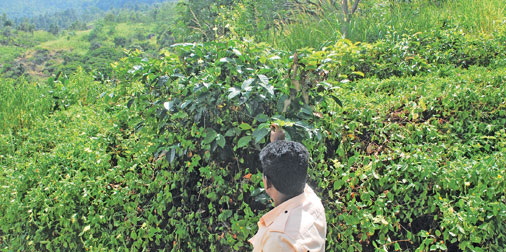Labour drain from plantations
By Chandani Jayatilleke
Tea is now a hip beverage with much hype over its health benefits.
But plantation companies are finding that changing worker attitudes and
replacing their aging workforce is harder than investing millions on
infrastructure and services.
|

Gopi is keen to get a job in Colombo |
Gopiratnam is from Talawakelle but works as a security guard at a
plantation bungalow turned into a hotel in Haputale, the approach to
which has breathtaking views of the southern plains.
He earns Rs. 20,000 a month but is not satisfied and instead wants to
move to Colombo where he has found a job that pays Rs. 30,000.
He has no desire to work on tea plantations where his parents and
grand-parents grew up and worked and is a good example of the new
generation of youth in the workforce that produce the Ceylon tea that's
now a world famous brand and has been a pillar of the economy for over a
century. Gopi is not concerned that he has to travel six hours to work
weekly from his hometown, taking two buses, if he takes up a job in
Colombo. Nor has he thought that living costs in Colombo - especially
food and lodging - would be much higher and would eat up much of his
anticipated monthly earnings.
White-collar job
If he were to work on the estates his monthly wage would be lower
than what he would get in Colombo but his living costs would also be
much lower. And he would be in the village he grew up in. Instead, he is
lured by the 'office-type' or 'white collar' jobs found in urban areas.
His views are typical of today's plantation community youth which has
become a big dilemma for the regional plantations companies managing the
estates which produce Sri Lanka's top export product.
The estate workforce is aging and the industry finds it hard to find
replacements for retiring workers. The RPCs have repeatedly highlighted
the facilities they provide workers and their families and that the
income of estate workers does compare favourably with that of other
agriculture sector workers.
|

Outgoing chairman of the Planterís Association of Ceylon,
Roshan Rajadurai |
Outgoing chairman of the Planter's Association of Ceylon, Roshan
Rajadurai revealed how much regional plantation companies (RPCs) have
invested in their workers when he addressed the association's 162nd
annual general meeting recently.
Since privatization, from 1993 to 2015, the RPCs total Capital
Expenditure was well over Rs. 55 billion which is far more than the
total profits earned by the RPCs, he said. Rs. 7 billion was paid as
dividends to Sri Lankan shareholders, Rs. 7 billion lease rental to the
government and Rs. 1.5 billion income tax to the state. According to the
State Ministry of Plantation Industries, up to the time of privatization
in 1992, US$ 275 million, equal to Rs. 35 billion in current terms was
the capital investments in the plantations through various donor and
mostly grant funding.
He also said that RPC workers daily wage rate Rs. 620 per day is
higher than the Rs. 590 rate the tea and rubber smallholders who
constitute 77% of the Tea/Rubber Sector labour force get under the
Statutory Tea and Rubber Wages Boards.
"Compared to the daily wage rate of our competing tea economies, the
rate in North India is Indian Rs. 115 per day, (SL Rs. 241) for a base
output of 26 kilos, South India is Indian Rs. 232 for 36 kilos (SL Rs.
487) and Kenya SL Rs. 443 for 48 kilos while in Sri Lanka is Rs. 620 for
16 to 18 kilos in RPCs. Tea Small Holders in Sri Lanka pluck around 26
to 30 kilos on a productivity based wage system."
Four-fold increase
Rajadurai said that during state management from 1980 to 1991, the
daily wages of workers increased from Rs.11.63 to Rs.48.32, only a
four-fold increase. Under RPCs from 1992, it increased from Rs.48.32 to
Rs.620, a 13-fold increase.
Before privatization from 1980 to 1991, the average daily labour wage
for the period was only 70% of the value of a High Grown kilo of Tea.
After privatization, from 1992 to 2015, it steeply increased to 116%.
From 2011 onwards, the labour wage was more than 150% and by 2015 this
ratio has increased up to160%. Even when the labour wage was only 70% of
the value of a kilo of tea, the estates were making losses prior to
privatization in 1992.
Survey
According to the last government Household Income and Expenditure
Survey (HIES), the Estate Sector Wages and Salaries are 23% above the
Rural Sector which is 77% of the population compared to the 5% in the
estate sector, Rajadurai said.
RPCs have to pay for not only the salaries and wages of the people
employed by them but dependents as well. For every one worker employed
by them, there are six non-working dependent souls who are resident and
living on the estates who draw on the facilities and resources of the
estate.
"However, in the Rural Sector; Agricultural activities, other cash
income, non-monetary income and rent value of own occupied housing add
up to higher total Household income than the Estate sector," Rajadurai
said.
"In the Estate sector, 40% of the households are above the total
house hold income group Rs. 27,975 to Rs. 32,338 compared to only 50% of
the rural sector according to HIES."
The own account workers and family workers who are engaged in the
agriculture sector, Tea and Rubber Small Holders have no guarantee of
regular year round employment, regular monthly wages and salary
advances, statutory dues, terminal benefits and facilities that are
compulsorily given to the RPC workers, Rajadurai said.
"In contrast, the RPC workers get fully secured, guaranteed life time
family employment with the estates having to offer a mandatory minimum
of 300 days of work per year on the estates from 18-60 years
irrespective of the level of the worker productivity or the field
productivity, even though climatic and weather conditions are not
favourable or conducive for the guaranteed offer of work in this manner,
in an agricultural enterprise so frequently subject to the vagaries of
the weather."
The comparative earnings of plantation workers have increased
substantially but, says Rajadurai, "the critical issue is in the house
hold cash management in the plantation sector and the entitlement mind
set and the dependent syndrome of estate sector workers." |

